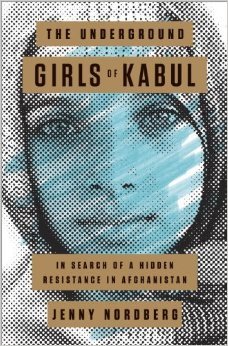Source: LibraryThing Early Reviewers
Hardcover, 368 pgs
On Amazon and on Kobo
The Underground Girls of Kabul by Jenny Nordberg is a perfect book for book clubs who want to discuss social and cultural issues. Nordberg is a journalist in Afghanistan, and she stumbles upon a family with a son who is not what he seems. He is bacha posh or dressed up as a boy in Dari — it is a technique used by families to save their families’ honor when they have only daughters. The pressure on low-income, middle-income, and even rich families to have sons is great, and while there are rules in place, they can be bent. Some families take their youngest girls and dress them as boys, and these girls are then allowed the same privileges as true sons — which means education, sports, being outside unescorted, and wearing boys clothes. While these privileges only last a short while, the daughters mostly enjoy their time as sons, but there are some who prefer to be girls and wear dresses, but do what they must for their families to survive in society and earn the money they need to live.
“Often, as we have seen in Kabul, it is a combination of factors A poor family may need a son for different reasons than a rich family, but no ethnic or geographical reasons set them apart. They are all Afghans, living in a society that demands sons at almost any cost. And to most of them, the health workers say, having a bacha posh in the family is an accepted and uncontroversial practice, provided the girl is turned back to woman before she enters puberty, when she must marry and have children of her own. Waiting too long to turn someone back could have consequences for a girl’s reputation. A teenage girl can conceive and should not be anywhere near teenage boys, even in disguise.” (page 68 ARC)
Nordberg consistently brings in outside data about the culture of Afghanistan, and she admits that her efforts to apply logic to the situation is pointless, and yet she keeps trying. These women have defined beliefs and adhere to their culture, even if they wish certain traditions and customs regarding women were different. Even one female politician adheres to the culture because to outwardly thwart it would bring dishonor to her family and particularly to her husband. Each of these women knows that to survive they must work within the system, and sons are regarded above everything, though women are considered property and as good as cash when making advancements in society — which is why many women were sold off into marriages at very young ages. While some aspects of the culture are less arcane, it is clear that Afghanistan is resistant to “Western” ideas and ways, and when the Taliban is in charge, things are even more dire for women.
The Underground Girls of Kabul by Jenny Nordberg touches upon a phenomenon that is more widespread than expected, but it is not documented, as these girls dressed as boys are considered acceptable so long as the secret is not widely broadcast. While many would see this as a form of resistance in a rigid society, the women in these families do not see it that way in many cases. It is merely a way to survive and maintain a honorable reputation in the eyes of society, and if dressing a girl like a boy magically results in a son being born, so much the better.








